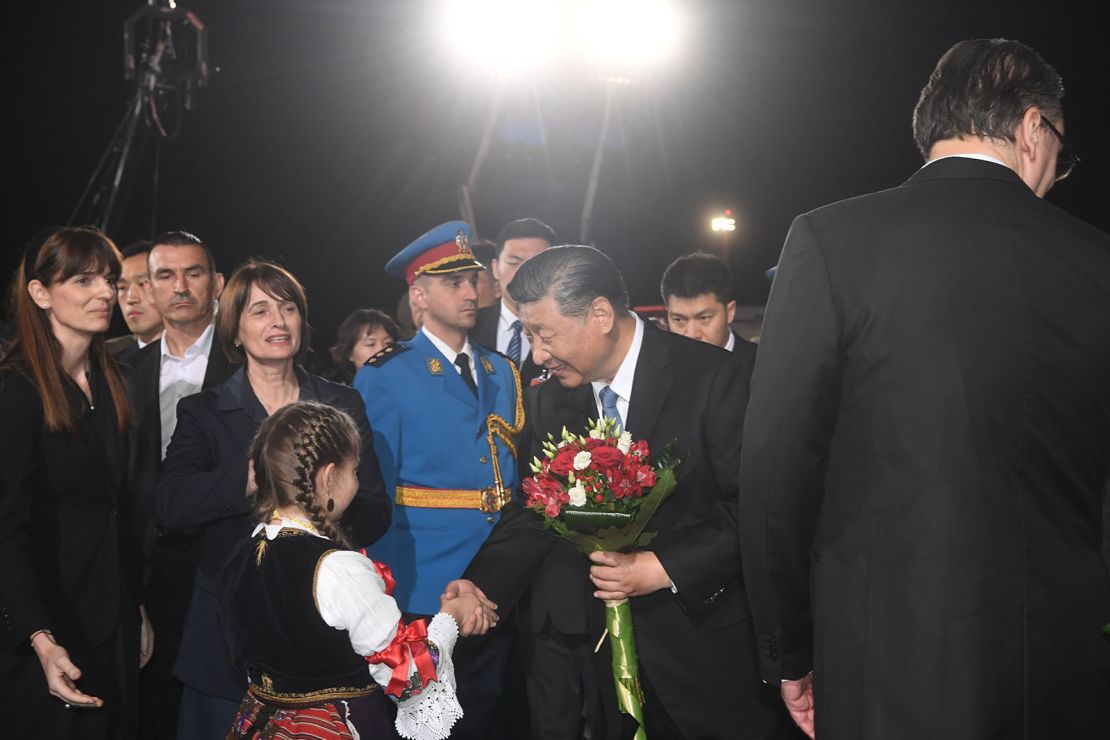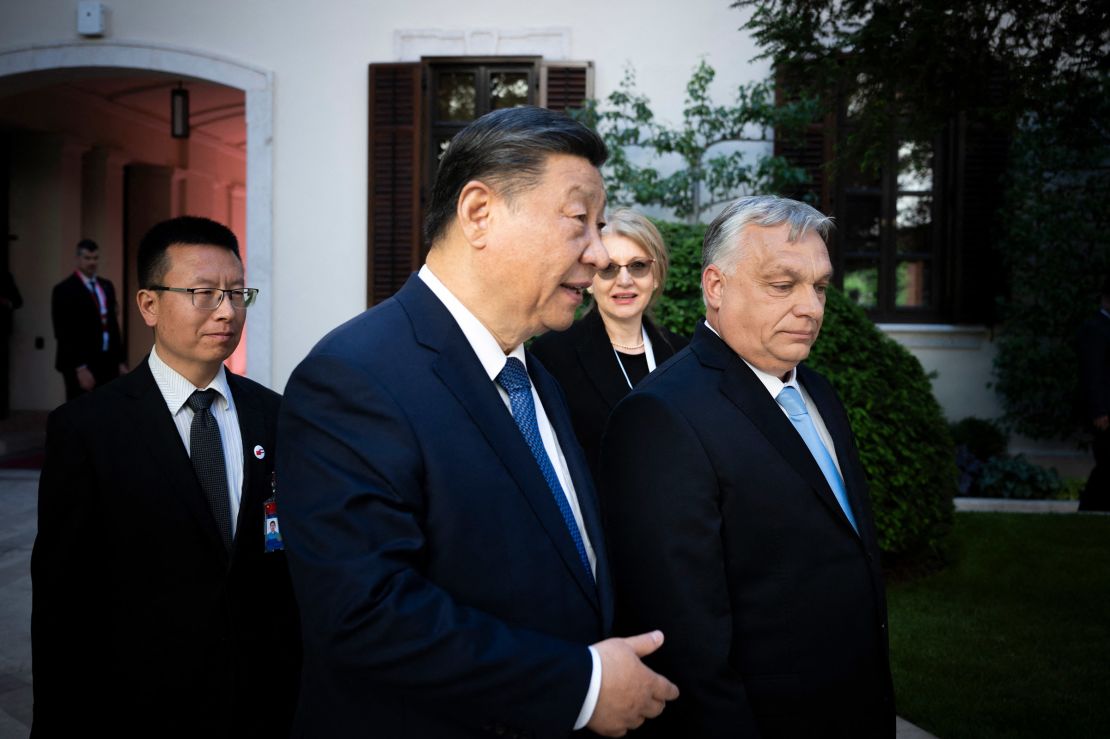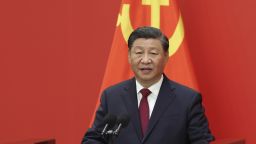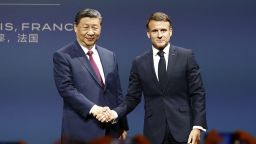Xi Jinping may have started his recent European trip by fielding tough questions in France about trade and Russia’s war in Ukraine, but the Chinese leader ended the sojourn late last week by projecting a stark message: that despite frictions with much of the continent, China still has fans in some European capitals.
Beijing’s pulling power was on show in Belgrade and Budapest, where streets were festooned with Chinese flags. As Xi and his wife Peng Liyuan touched down at both cities’ airports, folk dancers performed on the tarmac and, in contrast to the subdued welcome the couple received in Paris, Serbian President Aleksandar Vucic and Hungarian Prime Minister Viktor Orban were on hand to greet them.
Chinese state media played up the warm diplomacy, with headlines proclaiming China’s “ironclad” bond with Serbia and “golden friendship” with Hungary. Both countries, major recipients of Chinese investment, announced upgrades of their relations with China during the visits – a symbolic win for Xi that analysts say could play a role softening European policy on China in fraught areas such as trade, security and human rights.
But in the rest of Europe, the red-carpet welcome afforded Xi by Vucic and Orban – both widely seen as illiberal and Russia-friendly – may not play as well, analysts say, and emphasizes the shrinking number of European capitals where Xi would meet such a warm embrace.
China-Europe relations have been frayed by the European Union’s growing list of economic grievances with China, which could yet spiral into a full-blown trade war. Also in the mix are suspicions across Europe about Beijing’s global ambitions and influence, especially over its support for Russia – including allegations it is supplying dual-use parts which help the Kremlin’s war against Ukraine.
Making his first visit to Europe in five years, Xi was pressed on these issues early last week by French President Emmanuel Macron and European Commission President Ursula von der Leyen. Both are sure to closely watch any summit between Xi and Russian President Vladimir Putin in China, expected to happen soon.
In Paris, Xi stressed that China was playing no role other than “contributing to reaching peace” in Ukraine, and denied there was industrial “overcapacity” in China flooding the European market.
Such tensions vanished when Xi met Vucic and Orban.
His visits to Serbia and Hungary “send a very good message to a Chinese (domestic) audience that ‘we have close friends in Europe… Hungary and Serbia are real friends that we can do business with,’” said Philippe Le Corre, a senior fellow at the Asia Society Policy Institute’s Center for China Analysis, speaking at an event hosted by the center as Xi’s tour got underway last week.
But the countries’ inclusion in his itinerary was “embarrassing” for Paris, because both Orban and Vucic attended the Belt and Road Forum in Beijing last October alongside Putin, Le Corre added.

‘Shared future’
Xi’s visits to Serbia and Hungary helped him toward another goal – chipping away at a world order he sees as dominated by the United States.
With the inking of a joint statement, Serbia’s Vucic became the first European leader to commit to joining China in building a “community with a shared future.” The loosely formulated concept calls for a collaboration on shared interests, suggesting countries shouldn’t interact based on alliances, or be judged on their domestic politics and human rights record.
“That is the highest level of cooperation of two countries and I am proud that as a president of Serbia I had an opportunity to sign that declaration with President Xi,” Vucic said Wednesday of the accord, which came alongside a free-trade agreement and other pledges from Xi on expanding agricultural imports and direct flights.
Xi also marketed a shared worldview during his meeting with Orban in Hungary, which is a member of both the EU and NATO. Orban, whose increasingly authoritarian rule has raised alarm within the EU, defied mounting concerns within both blocs to upgrade his country’s relations to an “all-weather comprehensive strategic partnership.”
As well as being another symbolic win for Xi, this could encourage Orban to push back against efforts within the EU to “derisk” supply chains and slap tariffs on Chinese goods, analysts say. Speaking in Budapest Thursday alongside Orban, Xi appeared to allude to that, saying he hoped Hungary would use its rotating EU presidency beginning in July to “promote the stable and healthy development of China-EU relations.”
The two leaders also signed some 18 cooperation agreements, which Orban said covered sectors such as railways, IT, and nuclear energy. Xi declared the two countries would “deepen economic, trade, investment, and financial cooperation” and advance “key projects,” including the Budapest-Belgrade railway.
Both Serbia and Hungary are already key destinations for Chinese investment, with Hungary emerging as an increasingly important production hub in Europe for Chinese automotive suppliers including electric vehicle (EV) makers. In France earlier this week, Finance Minister Bruno Le Maire told journalists that Chinese company BYD was “welcome” to open a factory in France; but the EV giant appears to have already chosen its first foothold for car production in Europe, pledging late last year to open a plant in Hungary.
Beijing may also be hoping other countries on the continent take note, with analysts saying all this plays into Xi’s efforts to frame parts of Europe as benefiting from clearheaded views on China, versus others who are mimicking American efforts to contain it.
“Being close to these countries fits China’s domestic narrative that there are ‘smart countries’ in Europe who really understand China and do not support the United States – and China is working with these countries for the good of Europe,” said Liu Dongshu, an assistant professor of public and international affairs at Hong Kong’s City University.

Gateways to Europe
But Xi’s itinerary also underscores his limitations within Europe, others say, including in Central and Eastern Europe where Beijing previously made extensive efforts to deepen connections and win goodwill, including through Xi’s flagship Belt and Road infrastructure drive.
A Chinese mechanism to bolster relations with 16 Central and Eastern European nations has slowly lost support, in part because investments didn’t materialize at the expected scale, and also because China’s support for Russia soured relations in a region with a recent history of Soviet domination.
“The unlimited partnership and Beijing’s moral and material support to Moscow has infuriated many (Central and Eastern European) countries’ leadership and population,” said Tamas Matura, a senior fellow at the Center for European Policy Analysis. “This has definitely weakened China’s position in Europe.”
Meanwhile, longstanding tensions with Nordic countries and Italy’s exit earlier this year from the Belt and Road, as well as recent visits to China by Dutch Prime Minister Mark Rutte and German Chancellor Olaf Scholz, meant none of those countries were ideal for Xi to visit, Matura added. France, he said, was likely seen by Beijing as creating a potential for a diplomatic opening given its advocacy for Europe’s strategic autonomy from the US.
But there were few tangible signs from the trip that friction with Western European countries and the EU would abate, despite both Macron and Von der Leyen stressing the importance of dialogue and Xi’s two-day visit with the French president, which included a more personal trip to the Pyrenees and the signing of 18 cooperation deals.
And despite their limited economic heft – with 16 million people between them, and a combined GDP about a tenth of France’s, according to IMF figures – Serbia and EU member Hungary may become increasingly valuable to Beijing as tensions with the bloc continue, and the threat of a trade war looms.
“Orban and Vucic are both the kind of illiberal leaders who are positioning their countries between the rivaling geo-political blocs, hoping to avoid too strong dependence on any one of them,” said former Hungarian member of Parliament Gabor Scheiring, an assistant professor of comparative politics at Georgetown University in Qatar. “They don’t care about democracy or human rights. For them, foreign policy is strictly pragmatically about economic interests.”
And that could be a boon for China.
“Hungary and Serbia are strategic gateways for Beijing toward Europe… the value of the two countries as gateways to Europe will increase as the trade war escalates,” he said.
CNN’s Xiaofei Xu contributed to this report.



